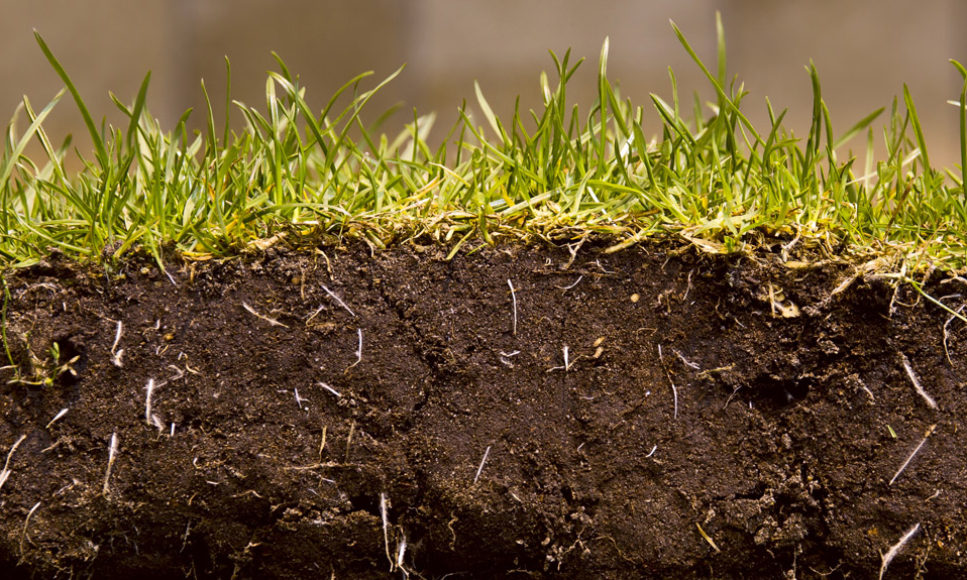A wide variety of materials have been described as soil amendments due to their ability to improve soil quality. Some examples include biochar, bone meal, blood meal, coffee grounds, compost, compost tea, manure, liquified seaweed, straw, peat, sphagnum moss, vermiculite, sulfur, lime, humic acid, and biosolids. Many soil amendments come in the form of certified organic products.
Organic matter: Arguably the most important type of soil amendment is organic matter, even though it only makes up 3 to 5% of a good soil’s composition. And it is one of the most common soil deficiencies, either because the soil was initially poor or because it was degraded in the construction process.
Adding organic matter will help your soil retain more moisture while still allowing it to drain and it will improve the structure and texture and add those all-important micro-organisms to help your lawn thrive.
Substances such as finished compost, well-rotted leaves, and other natural materials, worked down into soil, improve the way soil particles fit together and the way air and water move through them. Organic matter improves the soil’s capacity for holding water and nutrients and increases the activity of beneficial microorganisms. Earthworm castings amends soil with organic matter and benefits your plants in many other ways.
This nutrient-rich material serves to moderate the hardness of the mineral component. When the soil is predominantly clay or sand, the addition of organic matter (aged manure, Canadian peat moss, ground bark, sawdust, compost) makes clay soil looser, and easier to work. In clay soils, organic matter additions improve drainage, and allow air to move into the soil more readily.
Gypsum (releases nutrients and improves structure, helping it drain more efficiently): When soil pH is right, but other factors are off, gypsum can help. Gypsum modifies soil without any significant change to soil pH as it increases water penetration, loosens compacted clay soils, and promotes easier root penetration. Gypsum works quickly to improve soil structure, maintain soil pH and add calcium to soil.
Sphagnum peat moss – absorbs water, slowly releasing it for use by plant roots. It lightens clay soil, providing aeration, and adds mass to sandy soil, helping prevent the leaching of nutrients. Don’t confuse sphagnum peat moss with decorative sphagnum moss, which is primarily a floral design product.
Humic acid is one of the most important components of organic matter. It is an organic bio-stimulant that contains three very important components: Humic Acids, Fulvic Acids and Humin. It has many uses and has become very popular in organic lawn care and organic gardening.
Humic acid is a natural soil conditioner that acts as a microbial stimulator. It has a unique structure which includes a high concentration of trace minerals and organic acids. Humic acid enhances a plant’s ability to take in essential nutrients and improves soil structure. Proven Humic Acid Benefits include:
- Increases soil carbon
- Improves plant health
- Improves germination and viability of seeds
- Chelates macro and micronutrients to increase availability to the plant for a longer period of time
- Increases cation exchange capacity
- Improves soil structure for better aeration and water movement
- Stimulates beneficial microorganisms, which can improve long-term soil pH
- Especially effective on sandy soil
Sulfur: Adding sulfur and ground limestone (also referred to as agricultural lime) is much more effective if you can do it before seeding the lawn, or when regarding the site. But you also can incorporate them through aeration as you would compost.
Lime (makes soil less acidic): When lime is used to restore balance to soil pH, lawn grasses and other plants benefit. A source of calcium, lime works to raise soil pH. This is especially important when overly acidic soil (with pH lower than 6.0) interferes with your lawn’s ability to absorb nutrients, including those from fertilizers. Lime starts working as soon as it’s watered in and raises soil pH quicker than regular lime.







